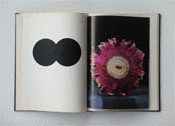An ongoing project by Daniel Gustav Cramer and Haris Epaminonda, "The Infinite Library" aspires to move beyond the categories that traditionally define books. Theirs is a collection arrived at through "inhuman and coincidental" processes, in which the second pages of any two books may be sewn into a unitary volume and, at times, overlaid with geometric patterning. Thirteen volumes have been realized to date, with several splicing content from Jukes Roger Sauter's book of mineral photography, Brasilien - Paradies der Edelsteine (1982), and Rudolf Pfister's 150 Eigenheime (1932), as if to illustrate the countless outcomes that can be arrived at even by cross-reading only two texts; and another volume quite appropriately pairing geometric patterning with Marcel Jaquet's photographs of Lanzarote, that most otherworldly of islands. Even with the limited number of examples on the website, it's evident that the conceptual bearing of this project almost precludes the need for actual objects; its case for infinite, parametric play might be all the more forcefully made by reducing its material terms to foreground the library's open-ended potential, as in Gareth Long's similar sculpture, Volumes 18,775 and 5,784,351,150,231,003 of the Total Library (2007). Given the considerable contributions of past thinkers to this topic, including Kurd Lasswitz's story "The Universal Library" (1901) and Jorge Luis Borges' essay "The Total Library" (1939) and story "The Library of Babel" (1941), one would expect a contemporary project like Gustav Cramer and Epaminonda's to break new ground. Lasswitz and Borges' ideas are certainly due for a revisiting, particularly in light of the trend, exemplified by Project Gutenberg and Carnegie Mellon's The Universal Digital Library, of using the Internet as a reserve for the sum total of our cultural works. Indeed, the storage and combinatory possibilities of the virtual sphere, only cursorily explored by the two aforementioned projects, may make it the most appropriate venue to realize Borges' fanciful and frightful vision. - Tyler Coburn
